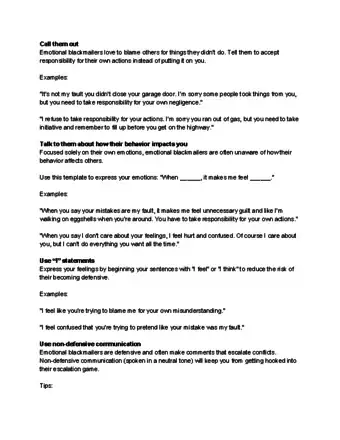This article was co-authored by Trudi Griffin, LPC, MS and by wikiHow staff writer, Danielle Blinka, MA, MPA. Trudi Griffin is a Licensed Professional Counselor in Wisconsin specializing in Addictions and Mental Health. She provides therapy to people who struggle with addictions, mental health, and trauma in community health settings and private practice. She received her MS in Clinical Mental Health Counseling from Marquette University in 2011.
This article has been viewed 69,311 times.
Emotional blackmail occurs when someone uses emotional threats, suffering, and exploitation to get you to do what they want. It's usually perpetrated by those closest to you and is a form of manipulation or abuse. If you’re dealing with emotional blackmail, you likely feel frustrated and trapped, but things can get better! Once you recognize the signs of emotional blackmail, you can set boundaries and confront the person. If the person is a loved one, you can learn to stop their pattern of manipulation.
Steps
Recognizing Emotional Blackmail
-
1Watch for threats or punishments if you don’t do what they want. These threats and punishments will target you emotionally, such as by withdrawing affection or making you feel insecure in the relationship. In most cases, the person will use manipulative statements to make you feel like something bad will happen if they don't get what they want. It may be blackmail if you feel like you have to do certain things to avoid their threats or punishments.[1]
- For example, they might say, “If you don’t want to move in together, that’s fine. I knew this relationship wasn’t going anywhere.” This statement might make you feel like you need to rush the relationship or risk losing them.
- They may say, “My family doesn’t see what I see in you and I’m tired of defending you. I guess there’s no point in you going to Christmas dinner with us since you don’t want to do big gifts.” They are trying to make you feel like you aren’t accepted so that you’ll do something, in this case, buy them presents, to gain acceptance.
-
2Notice if they threaten themselves to get what they want. This usually comes in the form of physical threats, ranging from self-harm to cutting. When these threats are used to emotionally blackmail, the person is trying to force you to do what they want. While the threat is against them, it’s meant to hurt you.
- Threatening self-harm alone doesn't mean a person is emotionally blackmailing. They may be reaching out for support.
- A blackmailer may say, “I need this vacation to feel better about myself! I guess if we can’t go on the cruise, I’ll just spend the week at home. Hopefully I don’t get too depressed and hurt myself.” In this case, they are trying to manipulate you into going on vacation.
Advertisement -
3Observe when someone’s trying to make you feel guilty for no reason. A blackmailer will accuse you of hurting them in some way, even though you haven't done anything. While it's important to recognize when you have made mistakes, be aware when someone is trying to use guilt against you. If your guilt is driving you to do things for them, they may be blackmailing you.
- For instance, they might use statements like “you never do what I want,” “you don’t care about my feelings,” or “my friends agree that you’re neglectful.” If you know these statements aren't true, don't let the person make you feel guilty.
-
4Notice when they’re making you feel a sense of duty. It's normal and appropriate to feel a certain responsibility toward family, friends, and your partner. However, your loved ones might try to make you feel a sense of duty when you shouldn’t so they can manipulate you. When this happens, the blackmailer tries to convince you to step into a role or take on a burden that isn't yours.
- If you feel like you consistently need to go out of your way to help the person, it may be emotional blackmail. Similarly, they may be emotionally blackmailing you if they make you feel obligated to do things that really aren't your responsibility, such as babysitting their kids for free, paying their bills, or doing repairs around their home.
- However, an emotional blackmailer will make you feel obligated to do things that aren't your responsibility. Let’s say your little sister wants you to give her $2,000 to help pay for college. She might say, “It must have been nice starting college first when Mom and Dad didn’t have other kids in college. I wouldn’t know. I thought maybe you’d give me the money because you knew you had it better, but whatever.” She’s hoping you’ll feel it’s your duty to give her the cash, even though it’s really not.
-
5Be aware of blaming behavior. People who use emotional manipulation often blame others for the mistakes they’ve made. They hope blaming you will get them what they want. If you take on the blame, they can manipulate you. If you are doing things for them because you feel responsible for the difficulties they're facing, they may be emotionally blackmailing you.
- Let’s say your partner lost their job. They might say, “I got fired because you were always texting me,” “You made me late every morning because you hogged the shower,” or, “I told you I needed better work clothes, but you wouldn’t listen.”
-
6Realize when someone puts their needs before yours. People who use emotional blackmail only care about themselves, so they’ll demand you tend to their needs. However, they’ll often ignore yours. This imbalance makes it easier to see they’re taking advantage of you. If the person consistently expects you to help them but refuses to reciprocate, they may be emotionally blackmailing you.
- For example, they may expect you to listen to them vent about work issues, but they might cut you off when you try to vent. Similarly, they may expect you to drop what you’re doing to help them, but make excuses when you need help.
- Another example of someone putting their needs before yours is self-deprecation. For example, if you share an accomplishment, they may talk about how they could never do anything similar so attention is refocused on them.
- Listen for when someone tells you how another person does something, such as if your mother says something like, “He calls his mom every week. He must really love her.” In this instance, she’s pointing out another person’s behavior because she wishes you would do the same thing.
Setting Boundaries
-
1Avoid giving them what they want. If you give them what they want, you will reinforce the manipulative behavior. You must say “no.” Stand your ground and be firm. If they keep pushing, step away and take a few moments to yourself. You can also call on someone else for support.[2]
- Say, "I'm really sorry to hear about your situation, but I can't afford to give you any more money. I can lend a supportive ear, though."
- If they threaten to harm you, remove yourself from the situation and call emergency services.
- If they threaten to harm themselves, call for help and stay with them. You might tell them, "I'm really worried about you right now. These are serious threats. Let's talk about what you're feeling."
- Although you may be afraid of what they’ll do, it’s unlikely they’ll act on their threats.
- Ignore some of the things they say to get attention by continuing a conversation as if they didn’t say anything.
-
2Ask them to clarify their intentions. This helps you call out the inappropriate behavior without accusing them of anything. It forces them to clearly state what they want, allowing you to address them without worrying about the emotional threats they’ve made.
- Say, “I’m not understanding what you’re asking me. What is it you want?”
-
3Tell the person which behaviors you will and won’t accept. This gives them guidelines about how they can behave around you. Tell them directly that their manipulative behaviors won’t be tolerated. Instead, they can tell you exactly what they want.[3]
- You might say, “It’s not okay for you to scream at me when you don’t get what you want. When you yell, I’m going to exit the situation.” Then say, “However, I’m happy to listen if you speak in a calm, kind tone.”
- You could also say, “I won’t talk things out while you’re crying, but I hope we can speak once you’ve calmed down.”
-
4Explain that threats of violence will be taken seriously. Whether they threaten themselves or you, it’s important to take the threat seriously and call for help. If they threaten you, remove yourself from the situation immediately. It’s unlikely they’ll follow through, but don’t risk it! Plus, it’s unfair to you to have to deal with constant threats of violence.[4]
- Say, “If you threaten to hurt me, I will call the police” or “If you say you’ll harm yourself, I’m going to call emergency services.
- If someone threatens you, it's best to remove yourself from the situation while you wait for help. Alternatively, you can ask a friend or family member to step in for support.
-
5Avoid taking responsibility for their feelings and actions. They alone are responsible for their feelings and actions, while you are responsible for yours. They may try to manipulate you by making you feel at fault for their suffering. This is a form of blaming behavior.
- For instance, your partner may try to make you feel responsible for their happiness. When they’re unhappy, they expect you to try to fix it. Although it's nice to try to cheer someone up, it's not something you have to do, and your life shouldn't revolve around it. Say, "I'm sorry you had a rough day, but I'm not able to change that. I would like to enjoy a nice evening with you, though."
- Similarly, your child might blame you for all of their mistakes, expecting you to clean them up. You might say, "I'm sorry you forgot to do your project, but I'm not going to stay up all night doing it for you."
-
6Follow through if your boundaries are broken. It’s likely that the person will test your new boundaries, so you need to stand firm. Do what you say you’ll do, such as calling the police when they make threats. When necessary, step away from the situation. When you follow through, they’ll learn that your boundaries are real.
- Say, “I told you I’d leave if you started yelling. I’m going home."
- If you call for help, you might also remove yourself from the situation. Do what's best for you!
- It will likely be hard for you to maintain your boundaries, but it will help resolve the manipulation in the long run. Stay strong!
-
7Take a break from the person if the problem persists. Your emotional health is important. If the person continues to use emotional blackmail, spend time away from them. This protects you and helps them see that you won’t tolerate their bad behavior.[5]
- You might just limit contact with the person to cut down on the amount of time you spend with them. Alternatively, you might talk to them about it first. You could say, "I really value our friendship, but I feel like you've been taking advantage of me. I need some space to process my feelings."
- Spend more time with people who are kind to you and who make you feel supported.
- If you do decide to mend fences with your manipulator, remind them of your boundaries. Say, "As I said before, I will call for help if you threaten yourself."
Confronting the Person
-
1Call them out when they blame you for things you didn’t do. Explain you will not take responsibility for something they did. Ask them to accept the blame for their own actions and encourage them to solve their own problems.
- Say, “It’s not my fault you forgot your lunch this morning. I’m sorry you were hungry, but you need to accept responsibility for your own actions.”
-
2Talk to them about how their behavior makes you feel. They are likely focused on their own feelings and may not even realize they’re hurting you. Telling them might help them understand that you’re the victim, not them. Although it likely won’t solve all of your problems, it can help.
- You might say, “When you say I don’t care about your feelings, it makes me feel really hurt. I do care about you, but sometimes I can’t do everything you want.”
-
3Speak to them in a non-defensive way. If you’re defensive, they may immediately become defensive, as well. This will make it harder to resolve the issue. Here are some ways to stay non-defensive:
- Don’t immediately deny their complaints or criticisms.
- Take turns speaking.
- Don’t make accusations against them.
- Avoid pointing out their bad behavior to justify yours.
-
4Use “I” statements when pointing out their behavior. This keeps the focus on how you’re feeling, rather than blaming them. It reduces the risk of them becoming defensive and shutting down.
- You could say, “I feel like you are trying to make me feel bad right now, but I haven’t done anything.”
-
5Ask them to help you solve the problem. This can get them on your side. It helps them see you as an ally, not an enemy. Also, it shows them that you aren’t attacking them.
- Say, “I feel like we’ve been having trouble communicating. I really want us to have a great relationship. Do you think we can work together to make things better?”
- Point out how you’re feeling in the moment. Most people don’t like to be called out on emotional blackmail and may stop immediately if you recognize it happening.
Coping with a Manipulative Loved One
-
1Recognize your own emotional triggers. Those closest to you have a special ability to manipulate you because you love and care about them so much. Also, they know you well, so they know how to really get under your skin. They’ll be able to target which appeal to your emotions will get them what they want:[6]
- Love can be used to soften you up, making you feel as though you can’t say “no.”
- Anger or apathy can be used to make you feel unloved and defensive.
- Criticism can make you feel like you aren’t doing enough as a lover, sister, or parent.
- Suffering (theirs) can make you feel guilty for not helping them have a perfect life.
- Helplessness can make you feel pity for them.
- Explosiveness can make you feel fearful of them.
-
2Offer to listen to their feelings without changing your mind. Sometimes the person might be feeling actual distress, and it helps to talk it out with them. However, you can’t give them what they want. Otherwise, you will encourage the manipulation.[7]
- You might say, “I’m not going to give you any money, but I love you and want you to feel better. Why don’t you tell me how you’re feeling.” Listen to what they have to say, then share how you feel.
-
3Step away while they’re crying or throwing a tantrum. It’s okay to take a break from the situation if their behavior is out of control. Their dramatics are meant to manipulate you. They’re hoping you’ll feel bad for not giving them what they want.[8]
- Remind yourself that you are not the one who’s causing them to behave this way. They’re doing it to themselves.
- Tell them, “I’m going to make us some tea while you cry it out. I’ll be back in a few minutes when you calm down.”
-
4Give them the benefit of the doubt when they try to be nice. Unfortunately, emotional blackmail can make you develop a skepticism toward your loved one. This can make you doubt their intentions, even when they aren’t trying to manipulate you. If you accuse them of manipulating them when they aren’t, it harms the relationship.[9]
- Let’s say your sister texts you to say she loves you and thinks you’re a good sister. You might think she’s trying to get something out of you, but give her the benefit of the doubt.
-
5Model healthy behaviors. You can accidentally teach your loved one to use emotional blackmail by using your emotions to get them to do what you want. Instead, model how you want them to behave by having good communication, being responsible for your actions, and following the rules. Teach them what it means to live in a stable, responsible household, such as being kind, completing chores, and following house rules.[10]
- For example, don’t try to control your child by saying things like “this breaks my heart” or “look how sad you’ve made me.” Similarly, don’t break their possessions when you become angry.
- You might instead say, “In this family, we respect dinner time. I make time to prepare and serve dinner, and I expect you to eat with me at the table.”
Help Talking to an Emotional Blackmailer
Warnings
- It’s possible that your loved one will try to act on their threats if you don’t do what they want. Be prepared to call emergency services if necessary.⧼thumbs_response⧽
References
- ↑ https://www.powerofpositivity.com/4-signs-of-emotional-blackmail/
- ↑ https://www.powerofpositivity.com/4-signs-of-emotional-blackmail/
- ↑ https://www.psychologytoday.com/us/blog/surviving-your-childs-adolescence/200909/emotional-extortion-how-adolescents-manipulate-parents
- ↑ https://www.powerofpositivity.com/4-signs-of-emotional-blackmail/
- ↑ https://www.powerofpositivity.com/4-signs-of-emotional-blackmail/
- ↑ https://www.psychologytoday.com/us/blog/surviving-your-childs-adolescence/200909/emotional-extortion-how-adolescents-manipulate-parents
- ↑ https://www.psychologytoday.com/us/blog/surviving-your-childs-adolescence/200909/emotional-extortion-how-adolescents-manipulate-parents
- ↑ https://www.psychologytoday.com/us/blog/surviving-your-childs-adolescence/200909/emotional-extortion-how-adolescents-manipulate-parents
- ↑ https://www.psychologytoday.com/us/blog/surviving-your-childs-adolescence/200909/emotional-extortion-how-adolescents-manipulate-parents
About This Article
Emotional blackmail is a form of abuse where someone threatens you, treats you badly, or plays the victim until they get what they want. If someone tries to emotionally blackmail you, it’s best to avoid giving them what they want, since this reinforces the idea that they can manipulate you. Instead, set boundaries for their negative behaviors. For example, tell them, “I’m happy to work towards a compromise, but if you start telling me what to do, I’m going to walk away from the situation.” It’s important to follow through on your boundaries or the person will just ignore them. If they start to get aggressive or nasty, tell them not to treat you like that. If they continue to threaten or abuse you, get away from them as soon as possible. Call the police or ask for help from a trusted friend if you need to. For more tips from our co-author, including how to deal with someone who’s threatening to harm themselves, read on.




















































































